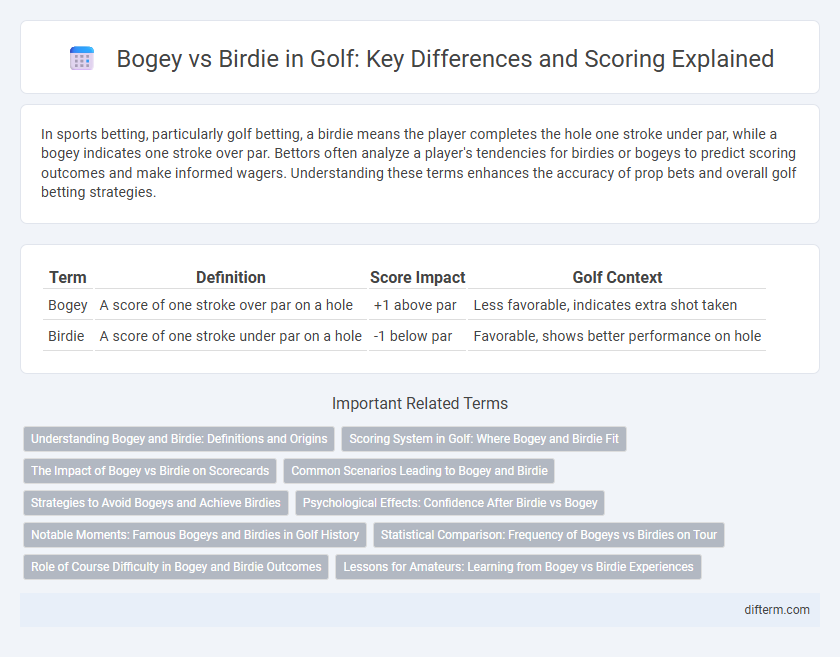In sports betting, particularly golf betting, a birdie means the player completes the hole one stroke under par, while a bogey indicates one stroke over par. Bettors often analyze a player's tendencies for birdies or bogeys to predict scoring outcomes and make informed wagers. Understanding these terms enhances the accuracy of prop bets and overall golf betting strategies.
Table of Comparison
| Term | Definition | Score Impact | Golf Context |
|---|---|---|---|
| Bogey | A score of one stroke over par on a hole | +1 above par | Less favorable, indicates extra shot taken |
| Birdie | A score of one stroke under par on a hole | -1 below par | Favorable, shows better performance on hole |
Understanding Bogey and Birdie: Definitions and Origins
A bogey in golf means scoring one stroke over par on a hole, while a birdie means scoring one stroke under par. The term "bogey" originated in the late 19th century and was originally used to describe the ideal score on a hole, derived from British railway slang meaning a ghost or imaginary player. "Birdie," coined in the early 20th century in the United States, comes from the American slang "bird," meaning something excellent, representing a score better than par.
Scoring System in Golf: Where Bogey and Birdie Fit
In golf's scoring system, a birdie represents completing a hole one stroke under par, enhancing a player's score by reducing the total strokes needed. Conversely, a bogey indicates finishing one stroke over par, increasing the player's score and reflecting a less favorable performance on that hole. Understanding the distinction between birdie and bogey is crucial for interpreting scorecards and assessing player performance during tournaments.
The Impact of Bogey vs Birdie on Scorecards
Bogey and birdie significantly influence golf scorecards by indicating a player's performance relative to par, where a birdie represents one stroke under par and improves the score, while a bogey signifies one stroke over par, negatively affecting the total. Consistently scoring birdies can lower a player's handicap and position in tournaments, whereas frequent bogeys increase the overall score and hamper competitive standing. Statistical analysis of scorecards highlights the correlation between higher birdie counts and successful outcomes in professional and amateur golf competitions.
Common Scenarios Leading to Bogey and Birdie
Bogey scenarios commonly arise from missed fairway shots, challenging pin placements, and poor green reading, resulting in one stroke over par. Birdies often occur on well-executed approach shots, favorable wind conditions, and precise putts, allowing players to score one stroke under par. Both outcomes are influenced significantly by course difficulty, player skill level, and weather variables.
Strategies to Avoid Bogeys and Achieve Birdies
To avoid bogeys and achieve birdies in golf, focus on precise shot placement by analyzing course layout and wind conditions to select optimal clubs. Practicing consistent green reading and improving putting accuracy helps minimize strokes and capitalize on birdie opportunities. Emphasizing controlled swing mechanics and strategic risk management reduces errors leading to bogeys while enhancing scoring potential.
Psychological Effects: Confidence After Birdie vs Bogey
A birdie in golf typically boosts a player's confidence, reinforcing positive mental momentum and encouraging risk-taking on subsequent holes. In contrast, a bogey often triggers self-doubt and increased pressure, which can disrupt focus and lead to cautious play. Managing these psychological effects is crucial for maintaining consistent performance throughout a round.
Notable Moments: Famous Bogeys and Birdies in Golf History
Tiger Woods' iconic birdie on the 16th hole during the 2005 Masters, known as the "Tiger Slam," showcased precision and skill that defined his dominance. One of the most memorable bogeys occurred when Greg Norman's double bogey on the 17th hole at the 1996 Masters cost him the title, highlighting the pressure of major tournaments. Jack Nicklaus' clutch birdies in the final rounds of his six Masters victories remain classic examples of strategic course management and mental toughness.
Statistical Comparison: Frequency of Bogeys vs Birdies on Tour
Tour-level golf statistics reveal that birdies occur more frequently than bogeys, with professional players averaging approximately 4.8 birdies per round compared to 3.5 bogeys. Data from the PGA Tour's ShotLink system indicates a birdie rate around 25% of holes played, whereas bogies are recorded at roughly 18%. This differential highlights players' scoring efficiency and risk management strategies on the course.
Role of Course Difficulty in Bogey and Birdie Outcomes
Course difficulty significantly impacts the frequency of bogey and birdie scores, with challenging layouts increasing bogey occurrences due to hazards, narrow fairways, and fast greens. Golfers on tougher courses often face higher stroke penalties, making birdies rarer as precision and risk management become critical. Statistical analysis reveals a strong correlation between course rating, slope, and the distribution of bogeys and birdies among players of varying skill levels.
Lessons for Amateurs: Learning from Bogey vs Birdie Experiences
Amateurs can enhance their golf skills by analyzing bogey versus birdie experiences, focusing on course management and shot accuracy. Understanding common mistakes that lead to bogeys helps refine technique and decision-making for more consistent birdies. Emphasizing mental resilience and strategic play improves scoring potential and overall game performance.
bogey vs birdie Infographic

 difterm.com
difterm.com